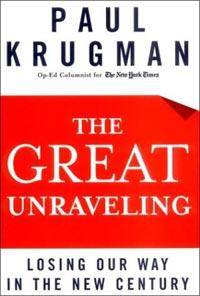|
Originally
published on Monday, December 15, 2003
in The Miami Herald
A look at the politics of economic policies
Economist Paul Krugman's
new book is a collection of columns written for The New York Times.
BY RICHARD PACHTER
rpachter@wordsonwords.com
 The
Great Unraveling: Losing Our Way in the New Century. Paul Krugman.
W.W. Norton and Co. 426 pages. $25.95 The
Great Unraveling: Losing Our Way in the New Century. Paul Krugman.
W.W. Norton and Co. 426 pages. $25.95
When Paul Krugman, a Princeton University professor and economist,
began a twice-weekly column for The New York Times in 1999, no one
raised a fuss. His prose was pretty crisp for an academic, but the
subject matter was (yawn!) global trade, finance and economic policy.
The U.S. economy was growing, the stock market was riding high,
and life was good.
Krugman served in the Reagan administration and though he reportedly
had lobbied to join Bill Clinton's economic team, he was rebuffed
and remained in academia. To liberals, he was hardly a beloved figure;
his enthusiasm for globalization earned him the enmity of the then-untarnished
Ralph Nader, and conservatives were, at best, indifferent. The Times
hired him as a columnist, they said, because of his skill in making
the arcane comprehensible to the masses.
CLEAR-CUT WRITING
Here's an example from his new book, a collection of columns, in
which he tried to illustrate the fallacies of the then-new president's
elimination of the relatively obscure alternative minimum tax:
``So this contractor is renovating your house. Funny how he got
the job: You checked the wrong box on a confusing form, and the
judge -- a close friend of the contractor -- ruled that you were
stuck. Anyway, though you told him that your priority was replacing
your leaky roof, he insists that first he wants to put in a luxurious
powder room. Back when he was trying to get your business, the contractor
said that he could put in the powder room for only $10,000, though
others insisted that estimate was way too low. Now it turns out,
sure enough, that it will cost at least $25,000.
''But he claims that he can save enough money on other parts of
the job to make up the difference. And one of his employees has
offered his personal assurance that the roof won't be neglected
-- though he admits that in the end it's not his decision, and his
boss refuses to put anything in writing,'' Krugman said in the column
that originally ran in March 2001.
And so on. Krugman's obvious talent for teaching resulted in some
very sharp explications of the new administration's economic policies.
More of a macro man than a micro guy, he couldn't help but analyze
and illustrate the politics behind the policies. And unlike most
pundits, being based in northern New Jersey rather than inside the
Washington Beltway allowed him, he said, to step back and really
talk about what was going on without being a part of the Washington
scene.
BROADER TOPICS
After the Sept. 11, 2001, terrorist attacks, many of Krugman's columns
dealt with issues of national security and other topics beyond the
scope of economics and business, angering an army of right-wing
critics. Krugman's writing sharpened but never became shrill, as
his academic background and understanding of economic intricacies
vis vis the federal government's rising debt and its ambiguous tax
policies helped cut through the fog of war and other obfuscation
(deliberate and otherwise).
The ongoing saga of corporate malfeasance and trickery in the financial
markets are also ripe subjects for Columnist Krugman. Ignore him
at your own peril.
Related
story: Judging a book by its cover.
|
